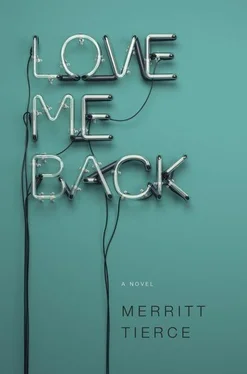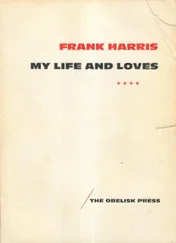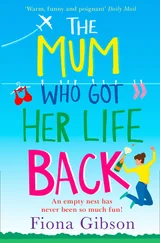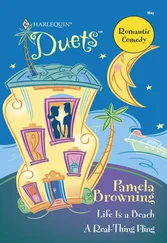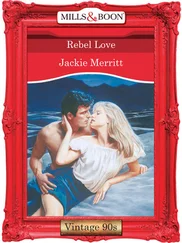I went over to Damon’s. I had only been seeing him at work. I would stand close to him while he scooped chips out of the warmer. He would look at me and raise his eyebrows. When he opened the door he said What’s up. I came in and we went back to his bedroom. The door of the weed closet was open and he was in the middle of tending the plants. What?! I said. You didn’t know? he asked. No idea, I said. I sat on the bed and watched him. There was a bong on the floor so I picked it up and took a hit. I lay back on the pillow still holding the stem and I imagined someone driving the blunt glass tip of the stem into the hollow of my throat. He came and sat down next to me and picked up the bong and I handed him the stem. So what’s happening, he said. I quit, I said. I walked out. I told him why and he took a bubbly hit and while he held the smoke in his mouth he said Kevin’s a prick. He lifted his chin and pushed up his glasses and inhaled twice and then he let out the smoke in rings.

We went up into the mountains, to a village outside Toluca, and we built a road. It was as hard as it sounds. Endless scraping in the heat, turning your mouth into your shirtsleeve to try to breathe through the asphalt fumes. Your dad soaked a bandana in water and wrung it out and draped it over his head like a wig, his cap on top to keep it in place. He looked funny but before long we all did it to stay cool. After eight hours we had completed about three feet of road. I was the only girl who had stuck with it all day. The others had stopped after lunch and gone to distribute clothes to the schoolchildren. You’re tough, he said, offering me a paper cone of water. I drank it and said I just feel strange around children. We drank more water and then saw our local guide gesturing for us to join the rest of the group to walk back into town, where we were staying. Vámonos, said your dad. He grabbed one side of the water cooler and I took the other.

Two years later. I sat on our balcony in a plastic chair and stared at the people in the cars going past. Some of them looked back at me and I wondered if the ones who didn’t felt the look and just didn’t look back, or if only some people can feel it when others look at them.
I didn’t make your dinner, your dad did. You came and sat in my lap while he made your sandwich. Just you in your diaper. Your sunset hair, so long down your tiny back. You sat quietly with me as if we were considering the same thing. He brought you the sandwich on a plastic plate and I held the plate for you. You pointed at the sandwich — thin ham between two soft pieces of brown bread — and said Cut it. Cut it, Mama.
I was fired from the Dream Café. The lunch rush was over so I was taking my break, sitting in one of the two-person booths with a grilled scone and the crossword. It was a Wednesday, the last day of the week that I bothered to attempt such clues as First PM of Burma (three letters).
Marlo sat down across from me as I put a buttered bite into my mouth. We need to talk, she said. I saw what you did today.
I chewed and swallowed. She told me not to ring them up so I thought it was okay, I said.
Tanya may act like she owns this place but she doesn’t. I do. So I’m going to have to let you go, said Marlo.
Whenever anyone says let you go I see myself falling like the girlfriend in Cliffhanger . I nodded, wondering how let you go became the way to say You’re fired. It sounds like an act of mercy or kindness. Releasing a feral cat after trapping and spaying it.
Do you have anything to say? Marlo asked.
I wasn’t sure what she wanted there. For me to grovel? I knew that what I’d done was sketchy. But I used to let myself be led into that kind of situation — I could see it coming, or feel it, but I went toward it anyway, in some kind of perverted defiance. Tanya had come in for lunch on her day off and we were doing half-price poinsettias to get rid of three gallons of cranberry juice that had been opened but seemed untouched. Marlo had stalked around the place trying to figure out who was responsible but there was no incentive to confess or turn someone in. I was supposed to ring them up before I made them, but I was in a hurry and Tanya was pounding them like shots. Then when I went to ask if she wanted anything else before I brought the check she said How many of these girly drinks did I have? Eight, I said. She whistled. That many, she said. Let’s call it five, okay? Maybe you lost count. Since it’s been so busy, she said. Okay, I said. Don’t worry, I’ll take care of you, she said. She looked at my hand, as it lifted her plate off the table. She looked at my arm. I like your — accessorization, she said, twirling her fingers in the air like she was opening a safe. I was wearing six copper bracelets. I could tell their jangling annoyed Marlo but I liked the way they punctuated all my movements.
Tanya had been halfway nice to me, in that beatup way career low-grade hospitality workers have. The ones in whom something has quit, bitterly, and then quit again, resigned. They’ve made it this far by not fucking up too much or knowing how to manage it when they do, so they’re typically proficient if not too shiny. Tanya exhibited the classic mix I’ve seen in certain individuals who’ve been in the business for ten years or more: an air of woundedness, of insult, attributable to their prolonged indentured servitude, combined with an in-spite-of-it pride in their personal performance of the job. Especially when new people showed up.
So she’d taken me under her dubious scraggly wing. She was tall and butch. This was a restaurant on the edge of the gayborhood so I was in the heterosexual minority. Tanya sometimes cooked and sometimes waited tables. Her face was usually gray, like someone on the verge of death. Even behind the line, where it got so hot Nacho and Fili would put cornstarch on their balls to keep them from sticking too bad, her face didn’t heat up. She showed me how to carry three glasses in one hand so I wouldn’t need a tray to get drinks to a four-top. She told me which bussers would roll your silverware for five bucks. Does that look appetizing to you? she said to me one day when I was so slammed I couldn’t get back to the window to run a hot cobbler before the à la mode had melted into a sad moat. I was going to drop it on the table anyway but she stopped me. Not really, I said. So don’t take it out, she said. Wait a few minutes and I’ll get you a new one. Those two won’t even notice. She could see my table over the kitchen line — two older gay men on the same side of the booth, clearly having an intense relationship talk.
She pulled the cobbler from the window. What do I tell Marlo? I asked. Don’t, she said. I do the count anyway. It was a spill.
Thanks, I said. I wasn’t sure what to make of the favor. Sometimes I thought she was flirting with me but I ignored it. Occasionally people — customers and new servers — thought I might be gay because I worked there and I didn’t try very hard with my face or my hair. I have big square hands I never grew into. They were meant for a farm or a piano. Or for carrying four full-size entrée plates up one flight of stairs, down two steps, up a ramp, through a door, around a fat clueless man waiting for a table on the lawn, and finally down a last set of stairs into the outdoor recessed patio. I never dropped anything there. That was years ago and I still feel like I need to knock on wood when I say that.
So many times I ran that gauntlet. If I were to advise someone going into the service industry, my second suggestion after Don’t would be Walk through the place and look for the tables farthest from the kitchen. You’ll probably be stuck in that station for a couple months. Imagine walking from wherever that is all the way back to the kitchen for extra salad dressing. Now imagine it eighteen more times, and that’s just for one table. You may think you’ll be waiting tables but really your job is to walk fast in a circle for six to eight hours every day. Don’t work somewhere with stairs, steps, ramps, outdoor seating, small water glasses, or kids’ menus.
Читать дальше
